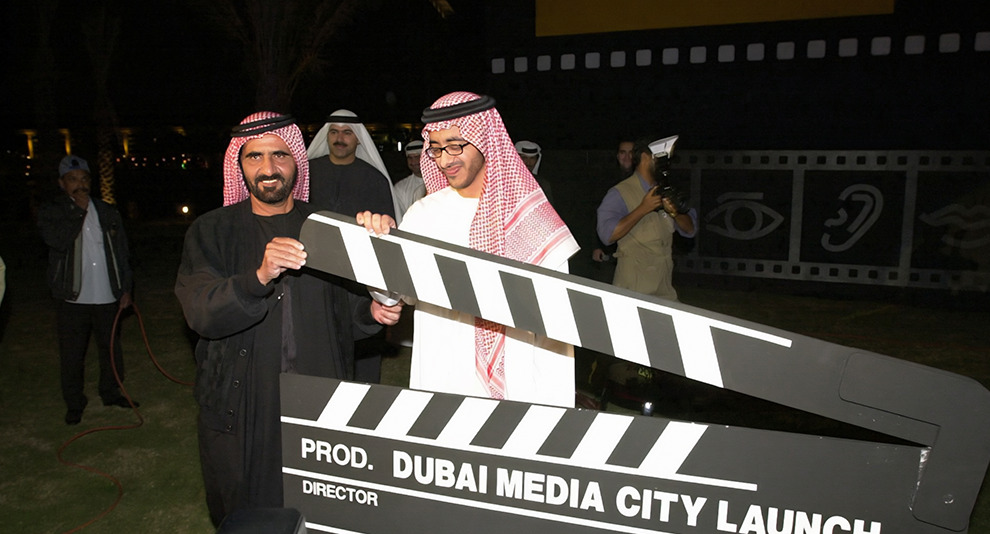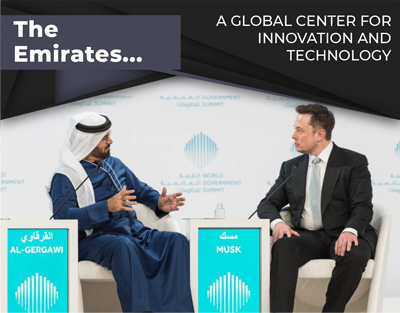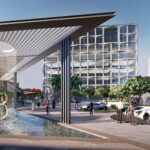His Highness Sheikh Mohammed bin Rashid Al Maktoum has been at the forefront of initiating various comprehensive strategic and developmental endeavors, which have revolutionized Dubai into a global economic powerhouse. Assuming the role of Crown Prince in the Emirate of Dubai in 1995, he fortified its economic standing on the global stage, serving as a pivotal link between the East and West across multiple sectors. These advancements played a pivotal role in propelling Dubai to the status of a world-renowned metropolis, evolving it into a global economic center leading in numerous international competitiveness indices.
His Highness entrusted Mohammad Abdullah Al Gergawi, Chairman of H.H.’s Executive Office, his trusted companion since the mid-1990s, with spearheading several of these projects. These initiatives marked Dubai’s significant leap onto the global stage at the dawn of the 21st century, with a specific focus on fostering a cluster economy. Each project was conceptualized as a commercial nexus encompassing a network of enterprises, institutions, and facilities, along with the seamless integration of research and service providers in relevant domains to offer a unified experience for stakeholders and investors.
Below are the five most prominent of these projects:
Dubai Internet City.. The Silicon Valley of the Middle East:
Recognizing the nascent stage of the Internet, His Highness Sheikh Mohammed bin Rashid Al Maktoum harbored a keen aspiration for the UAE to emerge as a frontrunner in the region’s technology sector. On October 29, 1999, he unveiled the commencement of the Dubai Internet City project during a press briefing. Exactly 364 days later, on the same date and venue of its announcement, His Highness inaugurated Dubai Internet City, heralding a groundbreaking era in the UAE economy driven by information and technology. His Highness articulated, “I am confident that the UAE will wield significant global influence in commerce and the realm of e-commerce. Leadership in the future will be predicated on nations’ embrace of information technologies and innovative concepts and services, rather than sole reliance on natural resources. Our era is witnessing the Internet revolution—the central nervous system of the emerging global economy.”
 Mohammad bin Rashid tours Microsoft Office in Dubai Internet City
Mohammad bin Rashid tours Microsoft Office in Dubai Internet City
In response to His Highness’s vision, Dubai Internet City was established as a free economic zone and a strategic enclave for enterprises targeting burgeoning markets, with the objective of positioning Dubai as the regional epicenter of the digital economy and a focal point for business and finance. At its inception, over a hundred information technology enterprises, including industry giants like Microsoft, Oracle Systems, MasterCard, and Compaq, secured licenses, solidifying Dubai Internet City as the nucleus of their operations in the Middle East.
Over the years, Dubai Internet City, a constituent of the TECOM Group, has witnessed remarkable expansion, hosting over 1,600 technology firms and accommodating 32,000 professionals. Additionally, the city attracted 60% of the Fortune 500 corporations worldwide. Gradually, the city earned the moniker of the Silicon Valley of the Middle East, particularly following a series of billion-dollar acquisitions of Dubai-based companies, such as Careem, acquired by Uber for 11 billion dirhams, Souq.com, acquired by Amazon for over two billion dirhams, and most recently, the 3.3 billion dirhams acquisition of Media.net.
While Dubai Internet City realized the vision of a single leader 15 years ago, today it embodies the aspirations of countless creators, innovators, trailblazers, and influencers on a daily basis.
Dubai Media City
How did a city with just one television station evolve into a regional and global media powerhouse? The journey commences with the visionary foresight of His Highness Sheikh Mohammed bin Rashid Al Maktoum, who envisioned Dubai as the focal point of regional media two decades ago, at a time when nations like Egypt and Lebanon dominated the field. Acting upon His Highness’s guidance, the city was established in 2000 as a free zone exclusively dedicated to media endeavors, complementing Dubai Internet City, as His Highness foresaw the merging of the technology and media sectors as integral components in Dubai’s economic landscape. Since its establishment, the city has attracted numerous regional and international media entities, with the MBC channel group being among the pioneers to relocate its entire operations from its London headquarters to Dubai Media City.
In a relatively short duration, Dubai Media City has swiftly ascended to the ranks of the world’s foremost media centers, attributed largely to the conducive climate and operational environment it affords to media entities. Presently, it accommodates over 4,000 businesses and hosts a workforce of 33,000 media professionals. It serves as the regional headquarters for numerous esteemed international news agencies and television networks, including Thomson Reuters International, Agence France-Presse (AFP), The Associated Press, and Bloomberg, alongside a diverse array of satellite and radio broadcasting networks, as well as various ancillary media services.
Dubai Healthcare City
Dubai Healthcare City, inaugurated in 2002 under the auspices of the Ruler of Dubai, was conceived with the overarching objective of positioning Dubai as a globally recognized center for healthcare excellence, alongside fostering advancements in health sciences education and research. The inaugural phase of the project spanned an area of 500,000 square feet, with comprehensive plans in place for further expansion to encompass a total expanse of 5 million square feet upon finalization.
 Mohammed bin Rashid briefed on the designs of the Dubai HealthCare City project by Mohammad Al Gergawi in 2002
Mohammed bin Rashid briefed on the designs of the Dubai HealthCare City project by Mohammad Al Gergawi in 2002
Under the guidance of its then-Board Chairman, the Dubai Investment and Development Authority executed the initial phase of the project, aimed at supporting the emirate’s strategic and developmental objectives in diversifying the national economy, as well as the formulation of plans and strategies concerning the new economy, at a total expenditure of $1.8 billion.
In 2015, His Highness initiated the second phase of the project, covering 22 million square feet along the Dubai Creek, with a particular emphasis on promoting health and well-being.
Prominent among the city’s medical and healthcare institutions and research centers are the Mohammed bin Rashid Academic Medical Complex, Al Jalila Foundation, and several hospitals, including Dubai Hospital, Rashid Hospital, Al Jalila Children’s Specialist Hospital, Emirates Specialist Hospital, and Mediclinic City Hospital.
The Dubai Healthcare City project significantly contributes to Dubai’s prominence as a premier destination for medical tourism. In 2018, it attracted $1.5 billion in foreign investments in the healthcare industry.
Dubai International Financial Center
Embracing a proactive stance towards future trends has always been our ethos, both in the past and the present. We diligently anticipate and prepare for forthcoming shifts, eschewing impromptu initiatives. To underscore our commitment, we conducted exhaustive research on the project and assembled a team of exceptionally talented individuals to explore all local, regional, and global influences.
In a 2002 press conference, Sheikh Mohammed bin Rashid announced the commencement of the Dubai Financial Center project. The project’s overarching objective was to enhance the emirate’s stature on the global economic and financial landscape, establishing it as a pivotal financial services hub bridging the East and West.

Since its inception, DIFC has experienced consistent expansion and attained a distinguished global standing, hosting over 24,000 specialized professionals and accommodating 3,644 active companies as of 2021. Notably, DIFC achieved its highest annual revenue and operating profit in 2021.
In 2019, Dubai ranked eighth among the world’s foremost financial centers, as per the Global Financial Centers Index, with the Dubai International Financial Center ascending in the rankings among over 100 centers.
Dubai Holding Company
Dubai Holding, founded in 2004 with a $200 million loan from HSBC, was established to oversee a collection of crucial and pivotal projects in Dubai that were initiated in 1999 and thereafter. This endeavor was undertaken to support the Government of Dubai’s long-term vision of cultivating a sustainable economy.

Mohammed Al Gergawi attends presentation of a Dubai Holding Company project design
Since its inception, the organization has initiated numerous ventures, enterprises, and notable projects across various domains, spanning finance, real estate development, tourism, healthcare, education, technology, media, research, biotechnology, and industrial production.
Under the leadership of Mohammad Al Gergawi from 2004 to 2017, the organization’s primary goal was to elevate Dubai into a prominent global hub for commerce and tourism.
Dubai Holding has played a pivotal role in introducing new sectors, establishing business hubs, and diversifying Dubai’s economy.
Within Dubai Holding, Al Gergawi spearheaded the formation of the TECOM Group, Dubai Properties, and Jumeirah Group. The projects within Dubai Holding’s portfolio, spanning 12 key sectors, have evolved into a conglomerate of international entities, including the Jumeirah Group, Dubai Properties, TECOM Group comprising 10 specialized economic clusters, Dubai Asset Management, Dubai Retail, and The Arab Media Group (AMG).
Presently, the company boasts assets exceeding 130 billion dirhams, with operational offices and engagements spanning 21 countries.






